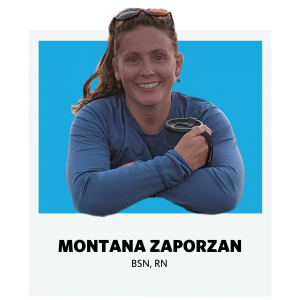
Montana Zaporzan is a Registered Perioperative Nurse who is entering her second year of the Master of Global Surgical Care. She currently lives in Nelson, British Columbia, Canada and also has worked throughout the entire province for the last year as a travel nurse. Montana is passionate about global surgical care and has experience in projects in Guatemala and Zambia.
Read on to find out more about Montana, her background and experiences, what lead her to the field of global surgical care, the MGSC, and more!
What has inspired you to study and work in the field of global surgery?
When I was in my fourth year of nursing school I was lucky enough to have multiple great mentors and professors who embodied what it meant to be passionate about global health. Inspired by these women, I decided my next goal after completing nursing school would be to choose a specialty that I could do anywhere and everywhere. As such, perioperative nursing has opened many doors for me in the global health sector. Although helping change a patient’s life in real time due to surgical intervention is rewarding, what initially drew me into surgery was the team dynamic that plays out behind the operating room (OR) doors. What I enjoy most about global surgery is the diversity within each team, highlighting the value of different life experiences and backgrounds each team member brings to the table and the amazing opportunity to learn it affords others. Within this environment, diverse experiences and team collaboration fosters the best possible patient care to the patients we see.
What are some of your hobbies & interests? What do you love to do in your spare time?
As much as I love my profession as a nurse, work-life balance is important to me and nursing has allowed me to have a very flexible schedule. On my days off, I focus on getting outside, practicing yoga or reading a non-fiction book that usually has to do with self-development (my all-time favorite is: The Way of Integrity by Martha Beck). In the winter you will find me skiing in the backcountry or hitting up local BC ski hills. Alternatively, in the summer the mountain bike comes out and the camping gear is permanently stored in my living room. My love for camping in the backcountry has inspired my partner and I to cross the Sunshine Coast Trail off our list this summer. Something new I am doing this year is completing my first Adventure Race called Mind over Mountain on Vancouver Island!
What advice would you give to prospective students?
Don’t be intimidated to apply! If you are passionate about global surgery this program will teach you so much! Students come from different backgrounds and everyone has something to share and learn from one another.
I understand you have an experience working on project in Guatemala and Zambia. What inspired you to work in low resource settings and what are some of your key lessons and experiences that you would like to share with our readers?
I remember someone asking me “How are you a nurse? I could never do that” I replied by thinking about a patient I had looked after the night before and said: “When someone is in front of you and the only option is to help them or leave them to suffer, there is an innate human response to help them and you don’t even think about it, you just do it.” When working in a low-resource setting you are often the only option for help or care someone has. Some people walk kilometres to get care, sleep on the ground and don’t eat for days just to receive this help sometimes. Working or volunteering in these environments keeps me humble and grounds me in humility. Building relationships with people in different countries even when language barriers are present is a strong reminder that we are all in this life together. A key lesson I have learned through my experiences so far is the importance of building relationships with trust and respect with international hosts. Working in low-resource settings has challenged many of my beliefs about what is historically “right and wrong” in variety of ways. This may be best illustrated through the realization that “best practice” is a construct and will change based on culture and resources and choosing a method of intervention needs to be adaptable, resourceful and culturally appropriate.
Is there any work/document/article that you are currently working on that you’d like to promote? Our community would love to find out what our students are currently working on. How can our community learn more about you? (Website, Linkedin, Youtube, etc)
I am a volunteer for a non-governmental organization (NGO) in Vancouver, Health for Humanity (H4H). Here, we are eager to complete our November surgical mission and primary outreach that has been postponed for the past two years due to COVID-19. You can learn more about what we do and how to get involved from the website (https://h4h.ca/) as well as follow us on Instagram and LinkedIn! I am currently working on my research project for the program, titled: Identifying Job and Community Satisfaction among Perioperative Registered Nurses in Northwest British Columbia. Through a survey and focus group I am hoping to identify key factors that can be related to retention and recruitment of nurses within this specialty and rural area of the province. Growing up and working in this area of the province I have seen first hand how nursing shortages are impacting my friends, family and coworkers and I think this is valuable information to identify at this time. This will be completed next April (2023)! I am more than happy to connect with any students or prospective students via LinkedIn: Montana Zaporzan, BSN, RN.
